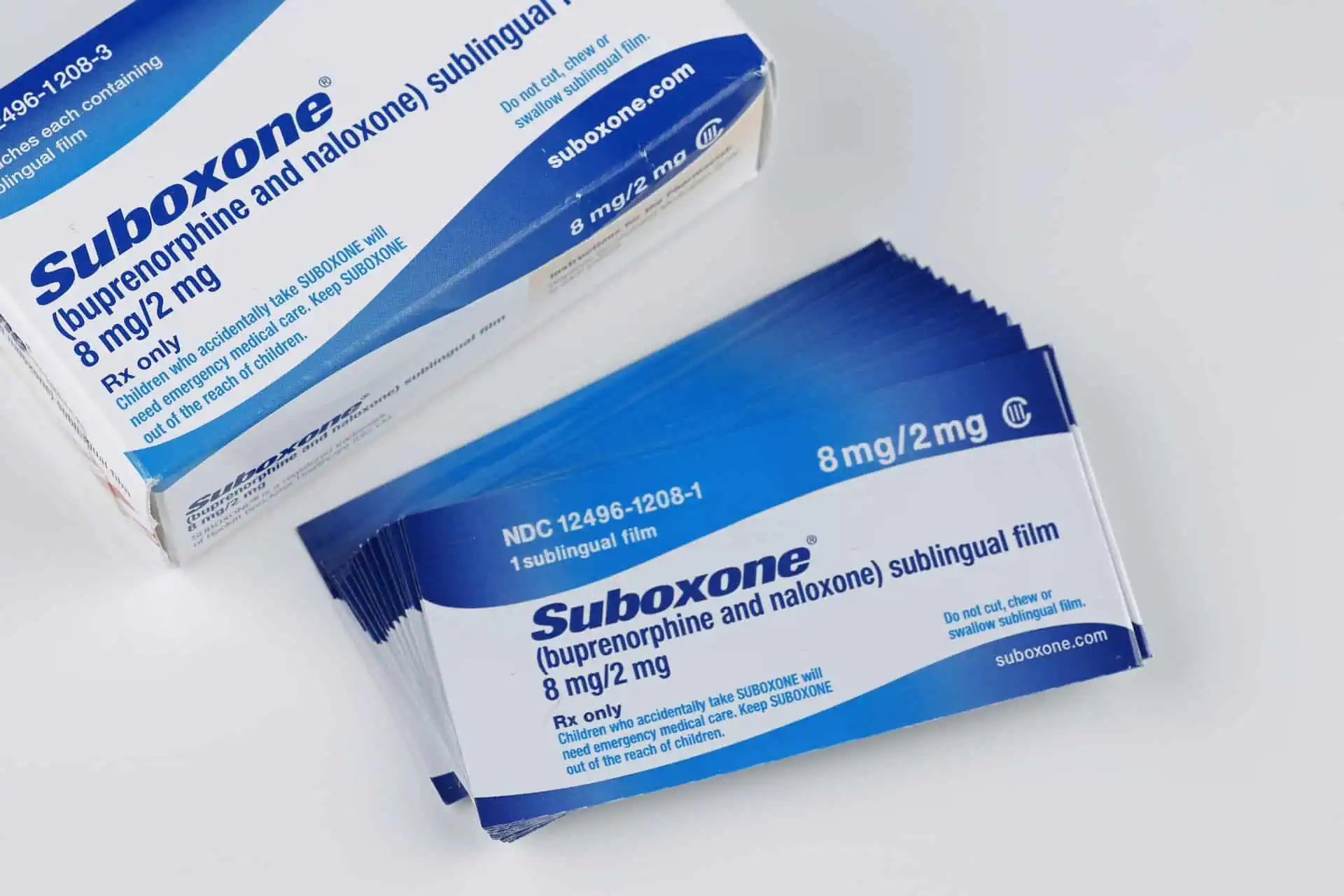FAQ: Does Suboxone Ruin Your Teeth?
- Last Updated: July 14th, 2025

Attorney Jessica Paluch-Hoerman, founder of TruLaw, has over 28 years of experience as a personal injury and mass tort attorney, and previously worked as an international tax attorney at Deloitte. Jessie collaborates with attorneys nationwide — enabling her to share reliable, up-to-date legal information with our readers.
Legally Reviewed
This article has been written and reviewed for legal accuracy and clarity by the team of writers and legal experts at TruLaw and is as accurate as possible. This content should not be taken as legal advice from an attorney. If you would like to learn more about our owner and experienced injury lawyer, Jessie Paluch, you can do so here.
Fact-Checked
TruLaw does everything possible to make sure the information in this article is up to date and accurate. If you need specific legal advice about your case, contact us by using the chat on the bottom of this page. This article should not be taken as advice from an attorney.
Key takeaways:
- Tooth damage and dental problems have been reported by patients poses questions about the relationship between Suboxone usage and oral health.
- Investigations into oral health issues have led to findings highlighting a need for awareness and preventive measures.
- It is essential that users of Suboxone stay well-informed about the possibility of dental side effects, and work closely with both their healthcare providers and dental professionals to minimize any risks.
FAQ: Does Suboxone Ruin Your Teeth?
On this page, we’ll discuss an overview of Suboxone, oral health risks associated with Suboxone, other potential side effects of Suboxone sublingual films, and much more.
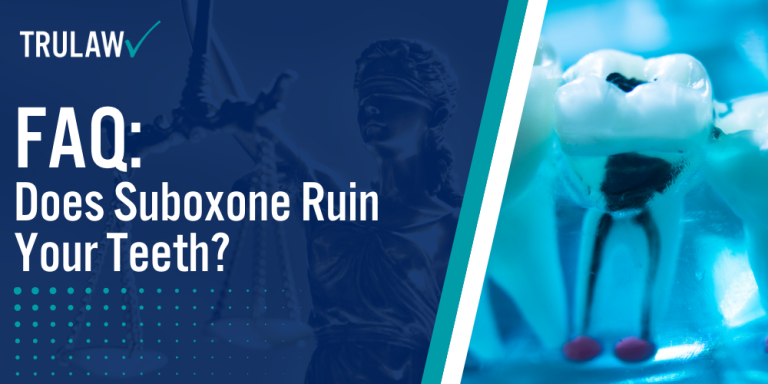
Intro to Suboxone: Potential Dental Risks
Suboxone is a medication commonly prescribed to individuals with opioid use disorder as a part of a comprehensive treatment plan.
The FDA recommends several steps to minimize the risk of dental health issues, such as:
- Wait until the tablet or film is completely dissolved, and then gently swish your mouth with water and swallow it.
- Hold off on brushing your teeth until at least an hour after the buprenorphine/naloxone has completely dissolved.
- Brush and floss regularly as long as it’s not within one hour after your dose dissolves.
- See a dentist as soon as you can after starting Suboxone and tell them that you’re taking it.
If you’ve suffered from oral health issues due to Suboxone treatment, you may qualify to file in the Suboxone Teeth Lawsuit.
Contact TruLaw for a free consultation using the chat on this page to receive an instant case evaluation.
Table of Contents
Oral Health Risks Associated with Suboxone
Suboxone, a medication used in the treatment of opioid addiction, has been linked with various oral health issues.
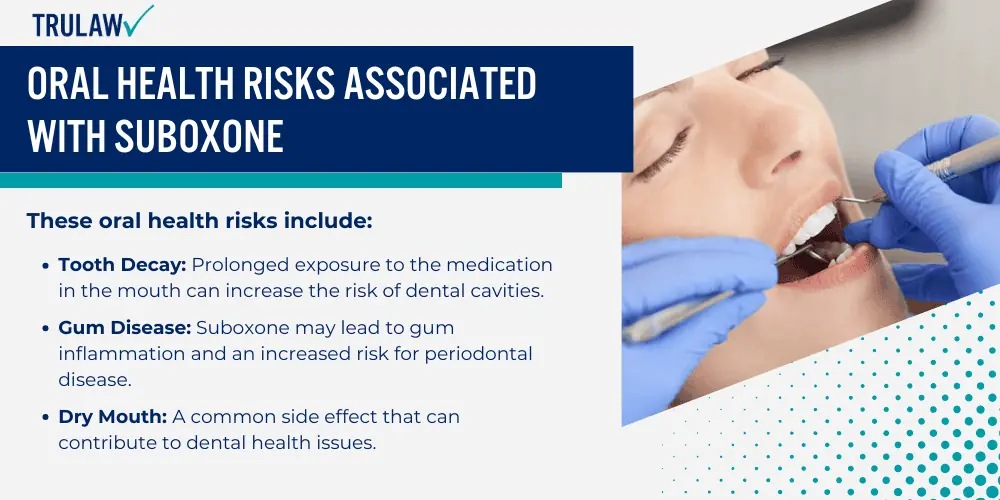
This section explores these potential risks in detail.
Suboxone’s Oral Health Complications
Suboxone can pose several dental problems when completely dissolved in the mouth.
These complications include:
- Tooth Decay: Prolonged exposure to the medication in the mouth can increase the risk of dental cavities.
- Gum Disease: Suboxone may lead to gum inflammation and an increased risk for periodontal disease.
- Dry Mouth: A common side effect that can contribute to dental health issues.
- Decay Cavities Oral Infections: A suppressed immune response in the oral cavity can lead to an increased risk of infections.
Risk Factors Contributing to Dental Problems
Suboxone can have unintended consequences for oral health.
Certain aspects of its use can create an environment that promotes dental problems.
Multiple factors contribute to the risk of dental problems in Suboxone users:
- Frequency of Use: The more often Suboxone is used, the higher the risk for oral health complications.
- Method of Administration: Dissolving Suboxone in the mouth can exacerbate oral health issues.
- Oral health History Prior: Patients with a history of dental issues may experience exacerbated dental problems.
- Hygiene Practices: Inadequate oral hygiene can lead to an increased risk of dental caries and other issues.
Evidence of Suboxone-Related Dental Issues
While Suboxone is a critical medication for treating opioid use disorder, emerging evidence suggests it may also contribute to dental problems.
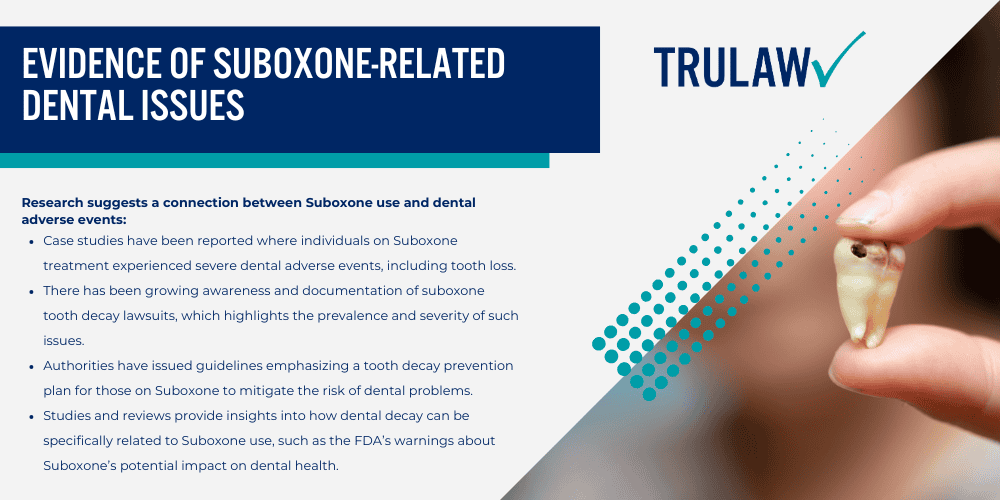
Research suggests a connection between Suboxone use and dental adverse events:
- Case studies have been reported where individuals on Suboxone treatment experienced severe dental adverse events, including tooth loss.
- There has been growing awareness and documentation of suboxone tooth decay lawsuits, which highlights the prevalence and severity of such issues.
- Authorities have issued guidelines emphasizing a tooth decay prevention plan for those on Suboxone to mitigate the risk of dental problems.
- Studies and reviews provide insights into how dental decay can be specifically related to Suboxone use, such as the FDA’s warnings about Suboxone’s potential impact on dental health.
Proactive Oral Health Management
Proactive oral health management for patients on Suboxone involves several crucial steps to prevent potential dental surgery.
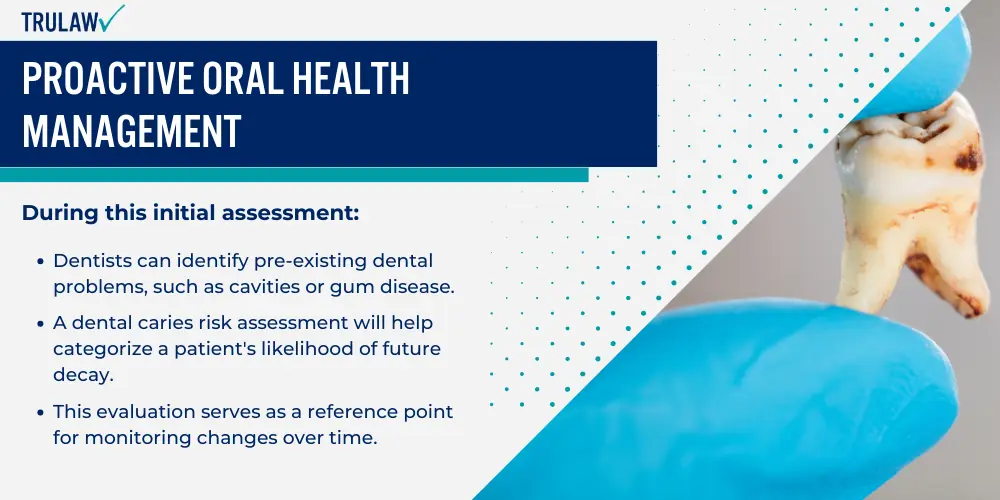
These include initial evaluations, tailored decay prevention strategies, and the collaborative involvement of healthcare professionals.
Importance of Baseline Dental Evaluation
A baseline dental evaluation is essential in establishing a patient’s oral health status before beginning Suboxone therapy.
During this initial assessment:
- Dentists can identify pre-existing dental problems, such as cavities or gum disease.
- A dental caries risk assessment will help categorize a patient’s likelihood of future decay.
- This evaluation serves as a reference point for monitoring changes over time.
- Establishing a comprehensive dental record ensures coordinated care between dental and medical professionals.
Developing a Tooth Decay Prevention Plan
By understanding your risk factors and oral hygiene habits, a dentist can create a personalized plan to keep your smile healthy.
This plan will focus on preventing cavities and keeping your teeth strong.
To minimize the risk of tooth decay, patients and dentists should work together to create a customized plan that includes the following:
- Consistent oral hygiene practices, such as brushing twice daily with fluoride toothpaste.
- Dietary recommendations to reduce sugary and acidic food intake that could harm teeth.
- Dental products like high-fluoride gels or sealants can be used for additional protection.
- Schedule regular dental checkups for professional cleanings and timely interventions.
The Role of Health Care Professionals in Prevention
Healthcare professionals should be aware of the potential impact of Suboxone on oral health and address these concerns with their patients to ensure they receive the necessary dental care for maintaining good oral health.
Healthcare professionals play a pivotal role in promoting oral health among patients using Suboxone by:
- Counseling patients about the oral side effects of their medication.
- Encouraging patients to seek dental treatment early for any oral health concerns.
- Helping to refer patients to dental care services when necessary.
- Collaborating with dental professionals to improve oral health outcomes through shared knowledge of patient health histories and current treatments.
Clinical Insights and Treatment Considerations
When considering the effects of Suboxone on dental health, it is essential to understand the medication’s influence on tooth decay and to consider ways to address oral health issues during opioid addiction treatment.
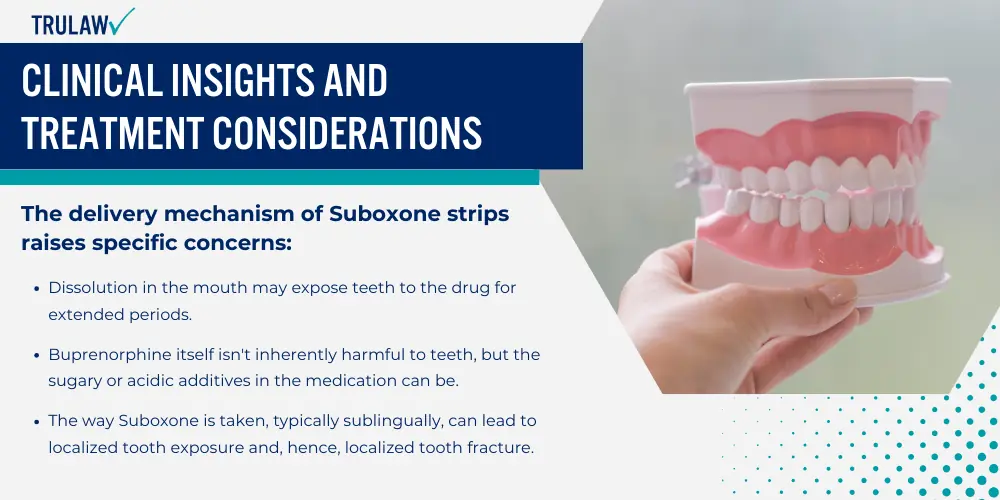
Understanding Tooth Decay Mechanism with Suboxone
Suboxone, mainly used to treat opioid dependence, has a formulation that is often dissolved in the mouth, increasing the risk of dental problems like tooth decay, cavities, and oral infections.
The delivery mechanism raises specific concerns:
- Dissolution in the mouth may expose teeth to the drug for extended periods.
- Buprenorphine itself isn’t inherently harmful to teeth, but the sugary or acidic additives in the medication can be.
- The way Suboxone is taken, typically sublingually, can lead to localized tooth exposure and, hence, localized tooth fracture.
- Saliva production may be reduced, lessening the natural defense against tooth decay.
Buprenorphine’s Impact on Dental Health
Buprenorphine is an active ingredient in Suboxone that may indirectly affect dental health.
These include:
- Reduction in pain perception, which might delay seeking treatment for dental issues.
- Dry mouth is a side effect that can contribute to oral health issues by reducing protective saliva.
- Possible neglect of dental hygiene due to lifestyle factors associated with addiction.
- Dental problems arise from the immunosuppressive effects of opioid use, increasing susceptibility to oral infections.
Addressing Dental Issues During Opioid Addiction Treatment
Early and ongoing dental care is critical for people undergoing opioid addiction treatment.
Regular check-ups can help prevent problems and identify any existing issues that might require attention, such as tooth extractions or fractures.
When managing oral health during opioid addiction treatment, a multi-faceted approach is essential:
- Regular dental check-ups should be encouraged to prevent and identify issues like tooth extractions or fractures.
- Pain management strategies must be adapted for dental procedures to avoid relapse.
- Patients should be informed about the importance of oral hygiene in reducing the risk of decay, cavities, and oral infections.
- Behavioral and other behavioral therapies can be crucial in reinforcing positive oral health practices.
By integrating comprehensive dental care with opioid addiction treatment, patients can maintain better oral health and overall well-being.
Legal and Liability Aspects
Dentists and healthcare professionals must know the potential legal implications of prescribing Suboxone.
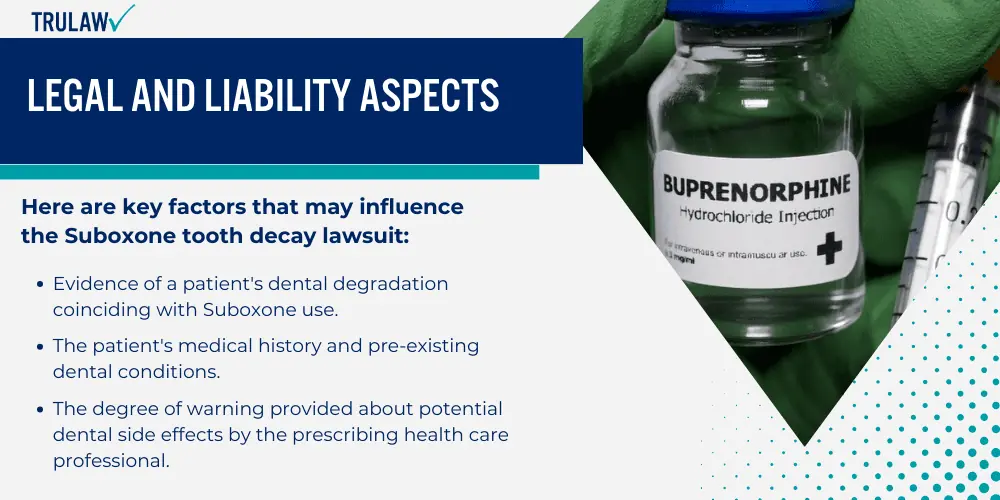
If counsel patients experience tooth decay attributed to the drug’s use, these implications may include product liability and negligence issues.
Potential for Suboxone Tooth Decay Litigation
Law firms are increasingly attentive to cases where patients allege that Suboxone has contributed to their tooth decay.
These civil suits often rest on arguments of failure to warn, negligence, or product liability.
Here are key factors that may influence the Suboxone tooth decay lawsuit:
- Evidence of a patient’s dental degradation coinciding with Suboxone use.
- The patient’s medical history and pre-existing dental conditions.
- The degree of warning provided about potential dental side effects by the prescribing health care professional.
- Attempts to mitigate dental harm, such as patient education on oral hygiene while using Suboxone.
Buprenorphine Medication Properties
Buprenorphine, the active ingredient in Suboxone, has properties and side effects that could potentially affect dental health.
However, medical literature does not conclusively establish a direct causation between the medication and tooth decay.
Understanding of Buprenorphine’s dental impact comes from observing:
- Its xerostomic effects (reduction in saliva production), which may contribute to an increased risk of tooth decay.
- Possible sugar content in the prescribed Suboxone film, which can affect dental health.
- Impact on dental hygiene practices: some patients may neglect proper care while on medication.
- Any additives in Suboxone that could potentially be implicated in dental issues.
Patient Education and Informed Consent
The standard of care requires that patients be provided with adequate information about the risks of buprenorphine medications, including potential dental side effects.
They should consent to the treatment with a full understanding of these risks.
Effective patient education and informed consent processes often include:
- A thorough discussion of Suboxone‘s benefits and risks.
- Recommendations on maintaining oral hygiene while taking Suboxone.
- Monitoring protocols for detecting early signs of tooth decay.
- A clear explanation of the patient’s responsibilities in managing their oral health.
- Documentation of the patient’s understanding and acknowledgment of the aforementioned points.
Personal Stories and Anecdotal Evidence
The impacts of Suboxone on dental health have been a topic of discussion among patients using the medication for opioid use disorder treatment.
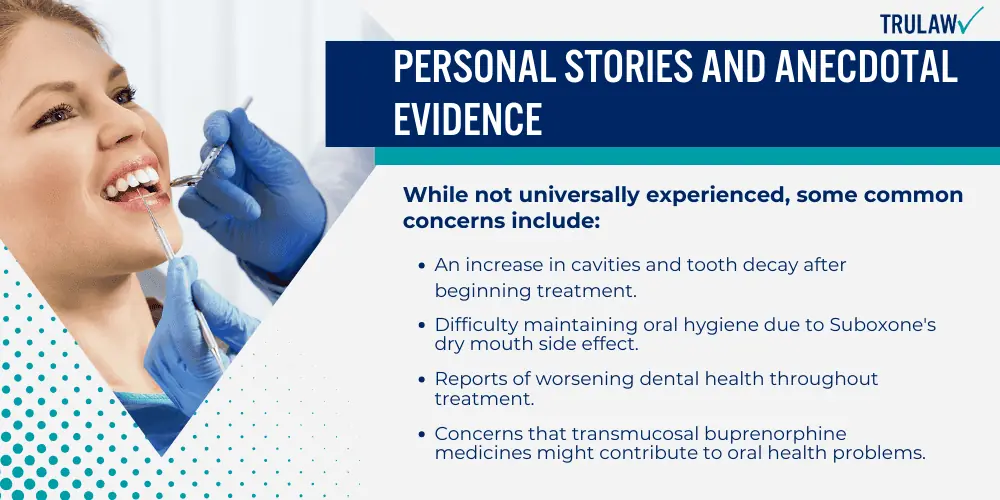
This section explores personal accounts and anecdotal evidence regarding the relationship between Suboxone and oral health complications.
Reports of Suboxone and Oral Health Complications
Patients using Suboxone sublingual films and other forms of medication have shared stories of poor dental health.
While not universally experienced, some common concerns include:
- An increase in cavities and tooth decay after beginning treatment.
- Difficulty maintaining oral hygiene due to Suboxone’s dry mouth side effect.
- Reports of worsening dental health throughout treatment.
- Concerns that transmucosal buprenorphine medicines might contribute to oral health problems.
Suboxone in Opioid Use Disorder Treatment
Suboxone is a transmucosal buprenorphine medicine that combines buprenorphine with naloxone.
Its role in treating opioid dependency is critical.
However, users have provided anecdotal accounts that highlight a potential side effect profile affecting dental health:
- Some patients attribute extensive tooth decay to the use of Suboxone.
- Others observe an association between the drug’s administration method and oral health issues.
- A few have questioned whether the ingredients in Suboxone sublingual films contribute to poor dental health.
- There are ongoing debates about the necessity of dental care guidelines specific to patients on Suboxone.
Patient Experiences with Dental Care on Suboxone
Suboxone, a medication used to treat opioid dependence, can have some side effects that impact oral health.
This can lead to patients experiencing a variety of dental care needs.
When on Suboxone, patients describe a variety of dental health experiences:
- Seeking professional dental care for severe tooth decay attributed to Suboxone use.
- The challenge of finding dentists familiar with sublingual buprenorphine treatments and their potential oral health impacts.
- Personal accounts of improved dental health routines to mitigate the risks of worsening dental health.
- Observations that not all individuals on Suboxone suffer severe tooth decay suggest that individual factors might also play a role.
The #1 Suboxone Lawyer: TruLaw
TruLaw is a leader in securing product liability settlements, offering unmatched expertise to represent your claim.
Our extensive network of legal professionals excels in maximizing compensation in pharmaceutical litigations such as the ongoing Suboxone lawsuits.
If you or a loved one suffered severe tooth decay, worsening dental health, or dental injuries after taking Suboxone Sublingual Film, you may be eligible to seek compensation.
Use the chatbot on this page for a free and instant case evaluation to find out if you qualify to join others filing a Suboxone Lawsuit.
Suboxone Lawsuit Frequently Asked Questions
-
Suboxone has been associated with dental problems when the buprenorphine medicines dissolve in the mouth, potentially leading to tooth decay or other oral health issues.
The FDA has warned about the risk of dental problems in patients taking dissolvable buprenorphine-based drugs.
-
Victims may be entitled to seek legal redress if there is evidence to support that Suboxone directly caused their dental issues.
They should consult a lawyer who is experienced in medical law or pharmaceutical litigation for advice on their specific situation.
-
Patients on Suboxone can safely undergo dental procedures, but it is imperative to inform the dentist of their medication regime.
The dentist may need to adjust their approach to pain management and anesthesia accordingly.
-
Patients are advised to wait a reasonable time after taking Suboxone before brushing their teeth to minimize potential damage to the oral mucosa.
It is also recommended that patients maintain regular dental check-ups and communicate about the medication with their dental professional.
-
Some reported side effects of Suboxone related to oral health include dry mouth, which can increase the risk of tooth decay and gum disease.
Oral health issues may require changes in dental hygiene practices or treatment plans.
-
There has been litigation related to Suboxone and dental issues, with lawsuits filed by patients who suffered dental problems allegedly as a result of treatment with Suboxone.
The outcomes of these cases depend on the specific evidence presented regarding causation and damages.

Managing Attorney & Owner
With over 25 years of legal experience, Jessica Paluch-Hoerman is an Illinois lawyer, a CPA, and a mother of three. She spent the first decade of her career working as an international tax attorney at Deloitte.
In 2009, Jessie co-founded her own law firm with her husband – which has scaled to over 30 employees since its conception.
In 2016, Jessie founded TruLaw, which allows her to collaborate with attorneys and legal experts across the United States on a daily basis. This hypervaluable network of experts is what enables her to share the most reliable, accurate, and up-to-date legal information with our readers!
Additional Suboxone Lawsuit resources on our website:
Here, at TruLaw, we’re committed to helping victims get the justice they deserve.
Alongside our partner law firms, we have successfully collected over $3 Billion in verdicts and settlements on behalf of injured individuals.
Would you like our help?
At TruLaw, we fiercely combat corporations that endanger individuals’ well-being. If you’ve suffered injuries and believe these well-funded entities should be held accountable, we’re here for you.
With TruLaw, you gain access to successful and seasoned lawyers who maximize your chances of success. Our lawyers invest in you—they do not receive a dime until your lawsuit reaches a successful resolution!
AFFF Lawsuit claims are being filed against manufacturers of aqueous film-forming foam (AFFF), commonly used in firefighting.
Claims allege that companies such as 3M, DuPont, and Tyco Fire Products failed to adequately warn users about the potential dangers of AFFF exposure — including increased risks of various cancers and diseases.
Depo Provera Lawsuit claims are being filed by individuals who allege they developed meningioma (a type of brain tumor) after receiving Depo-Provera birth control injections.
A 2024 study found that women using Depo-Provera for at least 1 year are five times more likely to develop meningioma brain tumors compared to those not using the drug.
Suboxone Tooth Decay Lawsuit claims are being filed against Indivior, the manufacturer of Suboxone, a medication used to treat opioid addiction.
Claims allege that Indivior failed to adequately warn users about the potential dangers of severe tooth decay and dental injuries associated with Suboxone’s sublingual film version.
Social Media Harm Lawsuits are being filed against social media companies for allegedly causing mental health issues in children and teens.
Claims allege that companies like Meta, Google, ByteDance, and Snap designed addictive platforms that led to anxiety, depression, and other mental health issues without adequately warning users or parents.
Transvaginal Mesh Lawsuits are being filed against manufacturers of transvaginal mesh products used to treat pelvic organ prolapse (POP) and stress urinary incontinence (SUI).
Claims allege that companies like Ethicon, C.R. Bard, and Boston Scientific failed to adequately warn about potential dangers — including erosion, pain, and infection.
Bair Hugger Warming Blanket Lawsuits involve claims against 3M — alleging their surgical warming blankets caused severe infections and complications (particularly in hip and knee replacement surgeries).
Plaintiffs claim 3M failed to warn about potential risks — despite knowing about increased risk of deep joint infections since 2011.
Baby Formula NEC Lawsuit claims are being filed against manufacturers of cow’s milk-based baby formula products.
Claims allege that companies like Abbott Laboratories (Similac) and Mead Johnson & Company (Enfamil) failed to warn about the increased risk of necrotizing enterocolitis (NEC) in premature infants.
Here, at TruLaw, we’re committed to helping victims get the justice they deserve.
Alongside our partner law firms, we have successfully collected over $3 Billion in verdicts and settlements on behalf of injured individuals.
Would you like our help?
